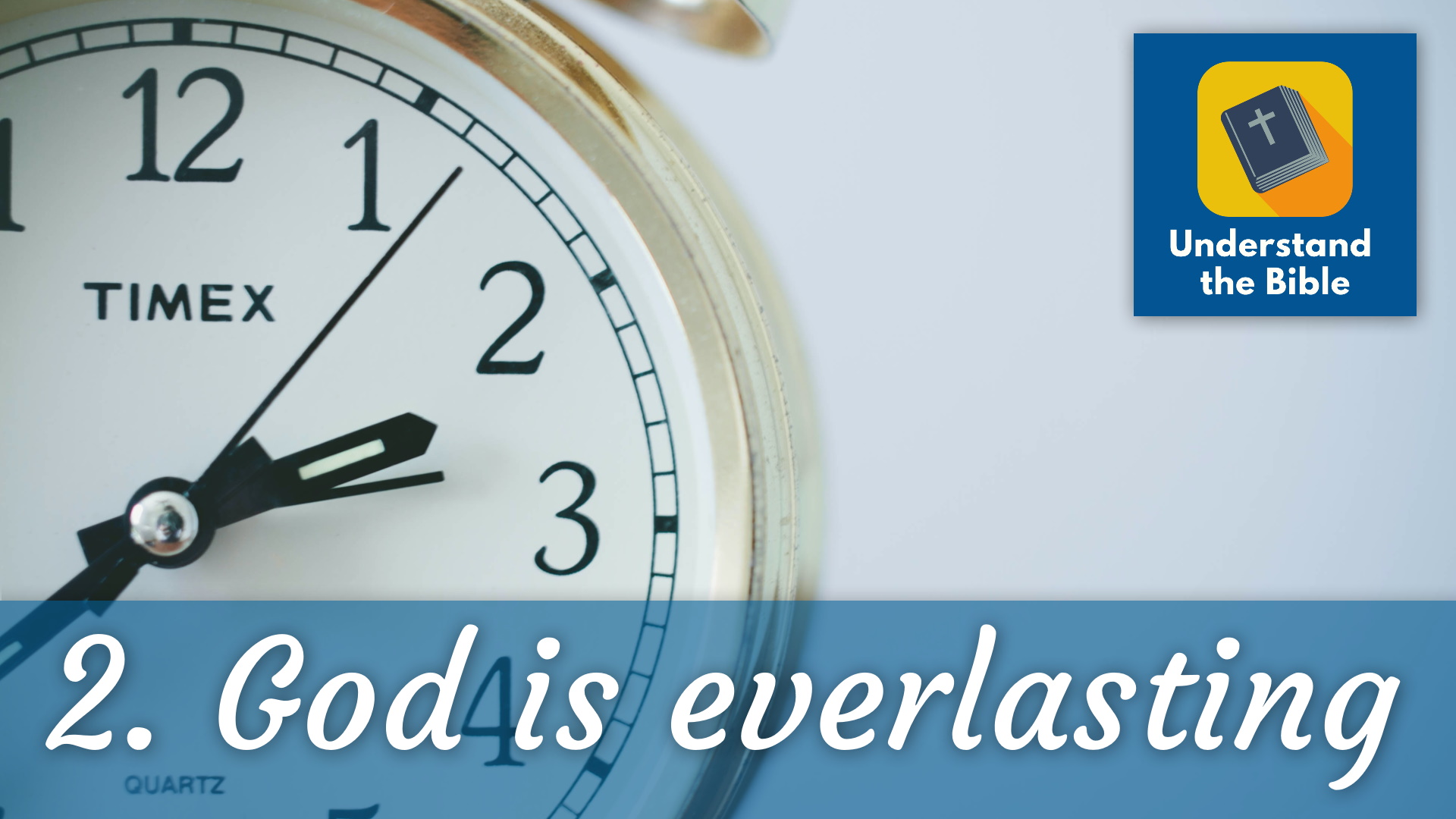In this fifth part of the Get to know God series, we’re looking at something called God’s impassibility. This is a really important aspect of God, and yet out of all of them this is probably the least popular. Part of the problem is that people don’t understand what ‘passions’ means! But this is important for understanding who God is: do we want a God who is actually able to help us in our suffering? For that, we need a God who is impassible.
What does impassible even mean?
A few years ago, a friend of mine wrote an article defending God’s impassibility. He started out with a brief definition of impassibility:
Divine impassibility refers to the belief that God can neither be acted on from without, nor experience ‘emotional’ change within, and that, more specifically, God can thus neither be caused to suffer, nor choose to suffer, in his divine nature.
This is a good definition to be going on with. Impassibility, or being ‘without passions’, means that God doesn’t have emotions in the same way that we do. (This is especially true about suffering – God does not suffer). Emotions, as it says, are about change: we human beings generally can’t go through a day without experiencing a number of emotional changes. An emotion is a change. But – as we have already thought about – God does not change. God is constant. That’s good news for us!
It’s good news because it means that God is not changeable like us, but is above our ways. Let’s take a look at the Bible to see what it says.
What does the Bible say?
A God who is above our ways

It’s important to understand that God is above our ways. This is what it says in the prophet Isaiah:
As the heavens are higher than the earth, so are my ways higher than your ways and my thoughts than your thoughts.
Isaiah 55:9
God’s ways are higher than our ways. It’s so important to understand this. God is not simply a bigger version of a human being! When we hear (as we did in the previous session) ‘God is love’, we think “ah, I know what that means. I love, therefore God’s love must be like mine”. This is the wrong way to think about it. Our love is like God’s, but that doesn’t mean it’s exactly like it! There are similarities and differences.
Theologians call this using analogical language: when we talk about ‘love’, our human love is like an analogy of God’s love. It’s got many similar things to it. Human love can help us to understand God’s love. But, crucially, it’s not 100% the same.
So it is with emotions. God doesn’t experience emotions in the way that we do.
A God who doesn’t change
We looked at this already briefly. Let’s consider another Bible verse, Numbers 23:19:
God is not human, that he should lie, not a human being, that he should change his mind. Does he speak and then not act? Does he promise and not fulfil?
God is unlike us: he doesn’t change his mind. When he says he will do something, he does it. When he makes a promise, he keeps it. That’s so unlike us: so many times in my life, I’ve promised to do something and then failed to do it. It’s not always because I’m lazy or I’ve forgotten (although both of those things have been true), but sometimes because I just can’t. For example, maybe I promise to pick up something at the supermarket, only to find they’re out of stock.
God never runs into those kinds of problems! This leads into the next section.
A God who knows the end from the beginning
Let’s look at another verse from Isaiah, this time 46:9-10:
I am God, and there is no other; I am God, and there is none like me. I make known the end from the beginning, from ancient times, what is still to come. I say, “My purpose will stand, and I will do all that I please.”

God declares that he has one plan from the beginning to the end. His purpose stands, because nothing can stand in its way. God doesn’t make mistakes, he doesn’t encounter unforeseen circumstances. I don’t know if the sign (pictured) is real or not – it seems a bit too much like a joke to me. But it’s true that we human beings often encounter circumstances which cause us to change our plans.
But it’s not just circumstances that can cause us to change our plans: emotions can, too. One moment we might feel happy and want to go out. But then we have some bad news, feel sad, and just want to stay in and be alone for a while. How we are emotionally affects our plans. This is never the case with God.
A God whose love is bigger than emotions
Jeremiah 31:3, “The Lord appeared to us in the past, saying: I have loved you with an everlasting love”. God’s love is everlasting. God’s love is also unchanging – e.g. Psalm 89:28, “I will maintain my love to him for ever, and my covenant with him will never fail.” God doesn’t one day decide to love and the next day change his mind. His love doesn’t grow cold. God’s love is pure, constant, unchanging, unflinching. God is able to carry out his purposes of love in every circumstance. It never fails.
This is a long way away from the ‘love’ that most of us are used to: do you know any couples who have split up because they fell out of love? It seems to happen a lot. Our emotions can come or go – but God always remains constant.
And this is really at the heart of impassibility: a God who is bigger than the passing whims of emotions, who does not change, who loves us constantly, with nothing able to stop him or make him love us less. It’s a love which is so big it’s almost unbelievable. It’s like nothing you or I have ever known.
Dealing with a few objections
Doesn’t the Bible say that God changed his mind?
There are a few passages in the Bible where it talks about God changing his mind, for example 1 Samuel 15:35, “Until the day Samuel died, he did not go to see Saul again, though Samuel mourned for him. And the Lord regretted that he had made Saul king over Israel.” Isn’t that proof that God does in fact change his mind? Not necessarily.
John Calvin said in his famous book, Institutes of the Christian religion, that God “lisps with us as nurses are wont to do with little children”. In other words, God is bigger than our language can adequately express. The Bible sometimes talks about God in a ‘human’ way to help us understand. That doesn’t mean that God ‘regretted’ making Saul king in the same way that we might regret something! Saul was the one who changed – not God.
Didn’t Jesus suffer?
One of the wonderful things that we celebrate every year at Christmas is the incarnation, the way that Jesus came into the world as a human being. This is wonderfully true. As Hebrews 2:18 says, “Because he himself suffered when he was tempted, he is able to help those who are being tempted.” That’s great news for us!
But doesn’t that mean, God suffered on the cross? Well – yes and no. When Jesus came to earth as a baby, he took on human flesh. He didn’t stop having a divine nature, but rather he took on a human nature. So Jesus, the Son of God, suffered on the cross – but the suffering was in his human nature. God in his eternal nature is – as we have seen – unable to suffer. But Jesus, as a man, became subject to time and was able to suffer.
We could spend hours and hours going into this – a good start might be this article on the Two natures of Jesus.
What differences does it make to us?
So let’s spend the rest of our time thinking about what it means for us. Why is it important that God should be impassible? How does it make a difference to us day-by-day?
What kind of doctor do you want?

Did you ever watch the series House, MD? The central character was Dr House – played by Hugh Laurie. He was not the nicest, caring, or most sympathetic of characters. And yet, time after time, he got the job done. Patients were brought to him who nobody else could diagnose and cure, and he managed to find out what was wrong with them.
Now, imagine you had a mystery illness which was proving impossible to diagnose. Who would you rather have as a doctor? A doctor who came alongside you, put his arm round you, sympathised with you, even wept for you? Or a doctor like House who had a terrible bedside manner, and yet who actually managed to find a cure for your disease?
I think most people, if not everyone, would prefer the doctor who was actually able to cure the disease! At the end of the day, although sympathy is nice, it doesn’t accomplish much in the long run. We want real help and healing, not simply a kind word!
Now, fortunately, with God we don’t have to choose between kindness or healing. But I think there is an important principle here.
An impassible God makes sense of our suffering
I believe that it is only an impassible God who can actually make sense of our suffering. Imagine that God felt our suffering, he wept with us – but couldn’t do much about it. Imagine if all God could do was come down to offer us a kind word and a hand on the shoulder. It might help a bit, but it wouldn’t really meet what we were looking for. Could we trust in those circumstances, in our darkest moments, that our suffering had meaning? Could we trust that our suffering was even necessary for our own good? And – the most worrying of all – could we trust that good would defeat evil?
What we really need to know when we’re going through suffering is only made possible because God is impassible:
- Suffering is temporary. If you know that any suffering we go through is only temporary, it helps to endure. Even if we suffer in this life, we know that we have an eternity ahead of us where there will be no more suffering!
- God will defeat evil in the end. When we’re struggling with some particular evil – perhaps a person or an institution – we know good will prevail in the end. We can have confidence that God’s plan will stand.
- Our suffering has meaning and purpose. Romans 8:28 says: “And we know that in all things God works for the good of those who love him”. All things – good and bad – work together for our good.
We can have confidence in this because we know that God is supremely good and loving, that God’s love is unchanging, and that his plans can never be thwarted.
An impassible God alone can fill us with confidence and hope in the future, and give us strength for the present.
Further Reading
If this is the first time you’ve read anything like this, I’m sure you will have questions or want to read more. The two books I mention in the previous session deal with God’s impassibility, so you might want to have a look at those.
There are a few more specific resources:
- What is Impassibility? – an article from Credo Magazine.
- ‘Only the non-suffering God can help’ – by Mark Smith. I mentioned this article at the start. It is scholarly but it goes into a lot more detail.
- The Unchangeableness of God – a chapter from Thomas Watson’s Body of Divinity, which is still readable despite being written hundreds of years ago.
Those links should give you plenty to be going on with!





